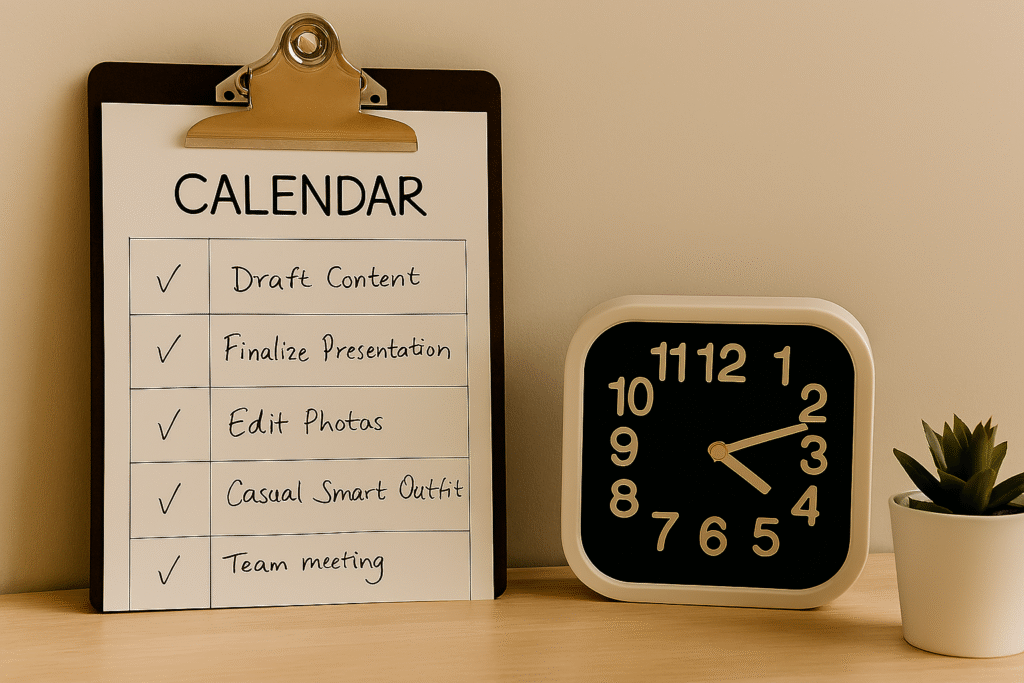This post contains affiliate links. if you purchase through these links, InfiniteFits may earn a small commission at no extra cost to you. Your support helps us keep creating style and self-growth contents.
How to Overcome Procrastination and Get Things Done
Have you ever stared at your to-do list for so long that it felt like wall art? I’ve been there—sitting in my favorite joggers, sipping coffee, convinced myself that “thinking about starting” was nearly identical to starting. Spoiler: It is not. Procrastination is not the same as being lazy. It’s frequently a combination of overwhelm, perfectionism, and dread of not accomplishing things “right.” But, over time, I’ve discovered a few tactics that help me transition from delay to completion—without the need for a motivational pep talk every morning.
Understand Why You Procrastinate
Procrastination isn’t always due to laziness; it can also be caused by a fear of failure, perfectionism, or simply feeling overwhelmed by a major work. The first step toward overcoming this is raising awareness. Recognize your triggers: do you procrastinate because you’re waiting for the “perfect moment” or because the activity is too daunting? Once you’ve identified the cause, you may address procrastination at its root. Recognize that procrastination is frequently an emotional response, not a productivity issue. Understanding the “why” behind your delay offers you control over the situation and allows you to develop better habits over time.

Here are some practical books that explain procrastination, improve productivity, and help you build winning habits.
Break Tasks into Smaller Steps
Big goals can be scary, which leads to procrastination. Simple everyday routines may help you shift your mindset and get started. The trick is to divide them into small, doable steps. Instead of writing “Finish project,” start with “Outline key points,” “Draft introduction,” and so on. Every small step you take builds momentum and makes the larger endeavor seem attainable. Consider climbing a staircase: each step may seem inconsequential, yet when taken together, they lead to the pinnacle. This technique reduces stress, promotes quick wins, and encourages you to prioritize progress over perfection.

Try using a daily planner or productivity journal that helps you break down tasks into small wins.
Set Clear Priorities & Deadlines
Without deadlines, procrastination thrives. Developing a productive morning routine can help to set the tone for the day. Create a timeline for all tasks, no matter how minor. Use prioritization approaches like the Eisenhower Matrix (urgent vs. important) or just write down your top three tasks for the day. Deadlines promote accountability and, when combined with clear priorities, make it easier to stay on track. Don’t try to do everything at once; instead, concentrate on what will actually move the needle. When your mind perceives a clear framework, it becomes less susceptible to distractions and provides you with the willpower to endure.

These vision cork boards and time-blocking planners can help you stay committed to deadlines.
Remove Distractions & Create a Focused Environment
Cluttered desks and continuous notifications can be detrimental to work. Keep your workspace clean, remove unnecessary items, and silence nonessential notifications. A peaceful and organized setting naturally promotes concentration. Your work environment has a direct impact on your mental state.Thus, decluttering tasks must be addressed for a minimal workplace. A minimalist workstation tells your brain that you’re in “work mode,” not “scroll mode.” Even minor adjustments, such as improved lighting or a more comfortable chair, can significantly enhance focus.

Here are some useful desk organizers and noise-canceling headphones to create a distraction-free zone.
Use the 2-Minute Rule & Pomodoro Technique
The 2-minute rule states that if a task takes less than two minutes, you should complete it immediately. For larger jobs, employ the Pomodoro Technique: work in focused 25-minute periods, followed by a 5-minute rest. These approaches assist you in overcoming resistance and making the process feel smooth. The benefit of these strategies is that they reduce the “mental wall” of beginning a task. You fool your brain into taking action, and once you start, momentum makes it simpler to keep going. It is about growth, not pressure.

These timers and productivity tools are perfect for practicing the Pomodoro technique.
Reward Yourself for Progress
Don’t wait till you’ve completed the big goal to be satisfied with your progress. Reward yourself for taking modest steps, whether it’s a quick stroll, a favorite snack, or a few minutes of relaxation. Celebrating victories keeps motivation high and the process enjoyable. Pairing rewards with confidence-building exercises keeps you motivated in the long run.Rewards provide positive reinforcement, teaching your brain to equate production with pleasure. Over time, this leads to a habit cycle in which accomplishing chores seems rewarding rather than stressful.

Here are some wellness products and comfort items to treat yourself during breaks.
Build Consistency Over Perfection
Waiting for the “perfect time” or being afraid of making a mistake are common causes of procrastination. The truth is that consistency beats excellence. Progress, however tiny, accumulates over time. Train your brain to focus on showing up on a daily basis rather than striving for perfect results. The trick is to consider in the long run: tiny actions repeated regularly will always surpass rare bursts of flawless performance. Everything’s not about doing everything right today but about showing up again tomorrow.

Explore these motivational books and habit trackers that help you build consistency without burnout.
Final Thoughts
Procrastination does not disappear overnight. However, with the correct mindset, tools, and a few adjustments to your routine, you can transform “I’ll do it later” into “I’m already on it.” Understanding your triggers, breaking down work, focusing, and praising progress can allow you to gain momentum and do more. Start small, remain consistent, and remember that action today beats a perfect plan tomorrow.

